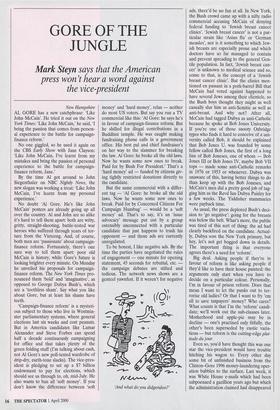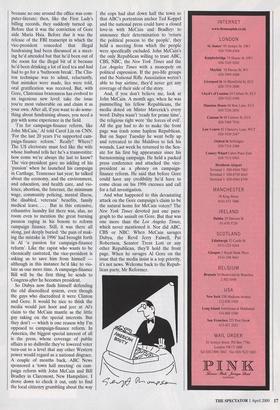GORE OF THE JUNGLE
Mark Steyn says that the American
press won't hear a word against the vice-president
New Hampshire AL GORE has a new catchphrase: 'Like John McCain'. He tried it out on the New York Times: 'Like John McCain,' he said, 'I bring the passion that comes from person- al experience to the battle for campaign- finance reform.'
No one giggled, so he used it again on the CBS Early Show with Jane Clayson: `Like John McCain, I've learnt from my mistakes and bring the passion of personal experience to the battle for campaign- finance reform, Jane.'
By the time Al got around to John Siegenthaler on NBC Nightly News, the new slogan was working a treat: 'Like John McCain, I've learnt from my personal experience.'
No doubt 'Al Gore. He's like John McCain' posters are already going up all over the country. Al and John are so alike it's hard to tell them apart: both are witty, gritty, straight-shooting, battle-tested war heroes who suffered through years of tor- ture from the Vietcong. And, of course, both men are 'passionate' about campaign- finance reform. Fortunately, there's one sure way to tell them apart: poor old McCain is history, while Gore's future is looking brighter every minute. On Monday he unveiled his proposals for campaign- finance reform. The New York Times pro- nounced them 'bold' and 'imaginative', as opposed to George Dubya Bush's, which are a 'toothless sham'. Say what you like about Gore, but at least his shams have teeth.
`Campaign-finance reform' is a mysteri- ous subject to those who live in Westmin- ster parliamentary systems, where general elections last six weeks and cost peanuts. But in America candidates like Lamar Alexander and Steve Forbes can spend half a decade continuously campaigning for office and that takes plenty of the green folding stuff (I'm talking about cash, not Al Gore's new poll-tested wardrobe of drip-dry, earth-tone slacks). The vice-pres- ident is pledging to set up a $7 billion endowment to pay for elections, which should see us through to, oh, mid-July. He also wants to ban all 'soft money'. If you don't know the difference between 'soft money' and 'hard money', relax — neither do most US voters. But say you run a TV commercial like this: 'Al Gore: he says he's in favour of campaign-finance reform. But he shilled for illegal contributions in a Buddhist temple. He was caught making fundraising phone calls in a government office. His best pal and chief fundraiser's on her way to the slammer for breaking the law. Al Gore: he broke all the old laws. Now he wants some new ones to break. Paid for by Bush For President.' That's a `hard money' ad — funded by citizens giv- ing tightly restricted donations directly to the candidate.
But the same commercial with a differ- ent tag — 'Al Gore: he broke all the old laws. Now he wants some new ones to break. Paid for by Concerned Citizens For Campaign Humbug' — would be a 'soft money' ad. That's to say, it's an 'issue advocacy' message put out by a group ostensibly unconnected with a particular candidate that just happens to trash his opponent — and those ads are currently unregulated.
To be honest, I like negative ads. By the time the parties have negotiated the rules of engagement — one minute for opening statement, 45 seconds for rebuttal, etc. — the campaign debates are stilted and tedious. The network news shows are a genteel yawnfest. If it weren't for negative And what do you didgeridoo?' ads, there'd be no fun at all. In New York, the Bush crowd came up with a nifty radio commercial accusing McCain of denying federal funding to 'Jewish breast cancer clinics'. 'Jewish breast cancer' is not a par- ticular strain like 'Asian flu' or 'German measles', nor is it something to which Jew- ish breasts are especially prone and which doctors have so far managed to contain and prevent spreading to the general Gen- tile population. In fact, !Jewish breast can- cer' is unknown to medical science and so, come to that, is the concept of a 'Jewish breast cancer clinic'. But the clinics men- tioned en passant in a pork-barrel Bill that McCain had voted against happened to have several Jews among their clientele, so the Bush boys thought they might as well casually slur him as anti-Semitic as well as anti-breast. And why not? After all, McCain had tagged Dubya as anti-Catholic because he spoke at Bob Jones University. If you're one of those snooty Oxbridge types who finds it hard to conceive of a uni- versity called Bob, it should be explained that Bob Jones U. was founded by some fellow called Bob Jones, the first of a long line of Bob Joneses, one of whom — Bob Jones III or Bob Jones IV, maybe Bob VII tops — made some anti-Catholic remarks in 1976 or 1953 or whenever. Dubya was unaware of this, having better things to do than keep up with the Bob Joneses, and McCain's men did a pretty good job of tag- ging him as the Revd Ian Dubya Paisley for a few weeks. The Yiddisher mammaries were payback time.
As usual, the press deplored Bush's deci- sion to 'go negative': going for the breasts was below the belt What's more, the public was tired of this sort of thing: the ad had clearly backfired on the candidate. Actual- ly, Dubya won the New York primary, but hey, let's not get bogged down in details. The important thing is that everyone agrees there's a need for 'reform'.
Big deal. Asking people if they're in favour of reform is like asking people if they'd like to have their house painted: the arguments only start when you have to decide on a particular colour. Personally, I'm in favour of prison reform. Does that mean I want to let the punks out to ter- rorise old ladies? Or that I want to fry 'em all to save taxpayers' money? Who cares? What counts is that I'm the 'reform' candi- date; we'll work out the sub-clauses later. Motherhood and apple-pie may be in decline — one's practised only fitfully, the other's been superseded by exotic varia- tions — but reform is the cutting-edge plat- itude du jour.
Even so, you'd have thought this was one star the vice-president would have trouble hitching his wagon to. Every other day some bit of unfinished business from the Clinton–Gore 1996 money-laundering oper- ation bubbles to the surface. Last week, it was White House e-mails which had been subpoenaed a gazillion years ago but which the administration claimed had disappeared because no one around the office was com- puter-literate; then, like the First Lady's billing records, they suddenly turned up. Before that it was the conviction of Gore aide Maria Hsia. Before that it was the release of the FBI transcript in which the vice-president conceded that illegal fundraising had been discussed at a meet- ing he'd attended but that he'd been out of the room for the illegal bit of it because he'd been drinking a lot of iced tea and had had to go for a 'bathroom break'. The Clin- ton technique was to admit, reluctantly, that mistakes were made, lies were told, oral gratification was received. But, with Gore, Clintonian brazenness has evolved to an ingenious new level: take the issue you're most vulnerable on and claim it as your own. After all, if you want to do some- thing about fundraising abuses, you need a guy with some experience in the field.
`I'm for campaign-finance reform, like John McCain,' Al told Carol Lin on CNN. `For the last 20 years I've supported cam- paign-finance reform.' Really? Where? The US electorate must feel like the wife whose husband tells her he's a transvestite: how come we're always the last to know? The vice-president gave no inkling of his `passion' when he launched his campaign in Carthage, Tennessee last year; he talked about the economy, and the environment, and education, and health care, and vio- lence, abortion, the Internet, the minimum wage, community policing, mental illness, the disabled, veterans' benefits, family medical leave. . . . But in this extensive, exhaustive laundry list there was, alas, no room even to mention the great burning passion raging in his bosom to reform campaign finance. Still, it was there all along, just deeply buried: 'the pain of mak- ing the mistake in 1996' had brought forth in Al 'a passion for campaign-finance reform'. Like the rapist who wants to be chemically castrated, the vice-president is asking us to save him from himself although in this instance he'd like to vio- late us one more time. A campaign-finance Bill will be the first thing he sends to Congress after he becomes president.
So Dubya now finds himself defending the old discredited system, even though the guys who discredited it were Clinton and Gore. It would be nice to think the media would just hoot and jeer at Al's claim to the McCain mantle as the little guy taking on the special interests. But they don't — which is one reason why I'm opposed to campaign-finance reform. In America, the biggest special interest of all is the press, whose coverage of public affairs is so dullsville they've lowered voter turn-out to a level that any other Western power would regard as a national disgrace. A couple of months back, ABC News sponsored a 'town hall meeting' on cam- paign reform with John McCain and Bill Bradley in Claremont, New Hampshire. I drove down to check it out, only to find the local citizenry grumbling about the way the cops had shut down half the town so that ABC's portentous anchor Ted Koppel and the national press could have a closed love-in with McCain and Bradley! to announce their determination to 'return the political process to the people', they held a meeting from which the people were specifically excluded. John McCain's the only Republican willing to trust ABC, CBS, NBC, the New York Times and the Los Angeles Times with a monopoly on political expression, If the pro-life groups and the National Rifle Association weren't able to buy airtime, they'd never get any coverage of their side of the story.
And, if you don't believe me, look at John McCain. A month ago, when he was pummelling his fellow Republicans, the media doted on Mister Maverick's every word: Dubya wasn't 'ready for prime time', the religious right were 'the forces of evil'. All the guy had to do to make the front page was trash some hapless Republican. But on Super Tuesday he went belly up and retreated to the Maldives to lick his wounds. Last week he returned to the Sen- ate for his first big appearance since his barnstorming campaign. He held a packed press conference and attacked the vice- president as a phoney on campaign- finance reform. He said that before Gore could have any credibility he'd have to come clean on his 1996 excesses and call for a full investigation.
And what happened to this devastating attack on the Gore campaign's claim to be the natural home for McCain voters? The New York Times devoted just one para- graph to the assault on Gore. But that was one more than the Los Angeles Times, which never mentioned it. Nor did ABC, CBS or NBC. When McCain savages Dubya, the Revd Jerry Falwell, Pat Robertson, Senator Trent Lott or any other Republican, they'll hold the front page. When he savages Al Gore on the issue that the media insist is a top priority, it's not news. Welcome back to the Repub- lican party. Mr Reformer.























































































 Previous page
Previous page